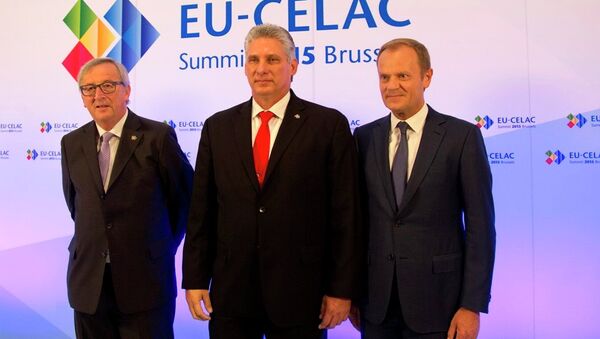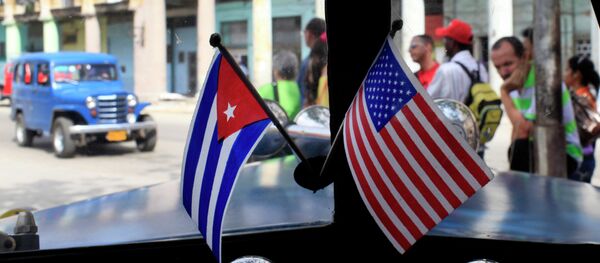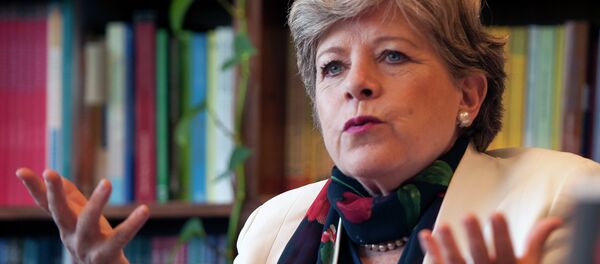MOSCOW (Sputnik) — The summit, co-chaired by Ecuadorian President Rafael Correa and European Council President Donald Tusk, brought together 61 heads of state and governments in the Belgian capital. The last summit between the 28-member bloc and 33-nation community was held in Chile in January 2013 and produced the Santiago Declaration.
The latest two-day session wrapped up Thursday with the adoption of agreements, including anticipated travel restriction waivers, and warmer ties between Europe and Cuba. It yielded two declarations and one action plan shaping the sides’ common future.
Declarations
The Brussels Declaration reaffirmed EU-CELAC's commitment to the 2013 Santiago Declaration and offered principles for an upcoming 2017 summit in the country holding the CELAC Pro-Tempore Presidency at the time.
The second declaration binds the groups to equal and inclusive association, and the 2015-2017 action plan prioritizes 10 areas of concern shared by the two regions. These include regional integration, climate change, education and migration.
Crisis Management
European Council President Donald Tusk expressed hope that existing crisis management operation agreements with Chile and Colombia would lead to greater regional security.
"The European Union supports the peace negotiations in Colombia and will back a future peace deal through the creation of an EU trust fund to support peace implementation," Tusk said at the conclusion of the summit.
Colombia has been battling the country’s Revolutionary Armed Forces of Colombia–People’s Army, or FARC, for over five decades. Colombian President Juan Manuel Santos announced peace talks with the militant-socialist group in 2012. The insurgent group, however, stepped up guerrilla attacks recently after ending a nearly year-long ceasefire.
Cuba
Tusk, meanwhile, actively welcomed steps toward the full normalization of ties between Washington and Havana, a position enshrined in the Brussels Declaration.
US President Barack Obama and Cuban President Raul Castro declared a diplomatic rapprochement in December 2014. The US State Department removed Cuba from its list of state sponsors of terrorism late last month, paving the way to the lifting of a trade and travel embargo, in place since 1960.
Ties between Cuba and the European Union developed in April 2014, with the signing of bilateral agreement on Political Dialogue and Cooperation, followed by talks in August of that year and March 2015.
Over one-fifth of Cuba's total trade is with the European Union, making it the Caribbean island's second-most important trading partner, according to the European Union External Action Service.
Visa Waiver
The sides signed bilateral short stay visa waivers with five Caribbean nations in the run-up to the EU-CELAC summit on May 28, which Tusk said would pave the way toward greater travel freedom.
"After the entry into force of this agreement, more than 80 percent of citizens of the CELAC region will be able to enter the Schengen area without a visa."
Similar EU short stay visa waivers are negotiated with Colombia and Peru.
Fiber Optics
As part of an effort to "bridge the digital divide" between the regions, the EU committed 25 million euros ($28 million) to laying a transatlantic fiber optic cable.
"The direct fiber optic cable that we agreed to build between our two continents is perhaps a simple, but nonetheless a strong symbol of our ever strong connection."
Economics
"We have invested more than we have in Russia, China and India together," Juncker said at the conference with Tusk and Correa.
The EU-CELAC deals, Juncker said, include a 346-million-euro ($390 million) funding program in the Caribbean, 230 million euros ($259 million) for sustainable development, as well as a 180-million-euro ($203 million) strategic investment project contribution.
In the area of education, the European Commission president said the bloc would invest 81.5 billion euros ($91.8 billion) in capacity building projects linking the regions' higher education institutions.



